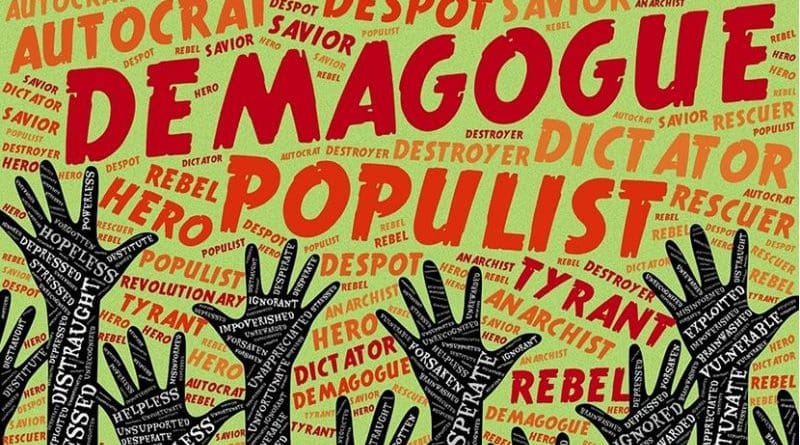Is Populism A New Democracy? – OpEd
By Hafiz Muhammad Zain Ul Abideen
In contemporary times, the growth of populist’s movements across the world has sparked a massive debate about the nature of democracy. Few argue that the movement is an essential correction to elitist rules, providing voice to the excluded masses. Other see it as a paramount threat to the erosion of democratic ideals, characterized by demagoguery and the suppression of minority rights. But among these contrasting narratives, a question remains: Is populism the new democracy?
In its most basic sense, democracy is based on the rules of popular sovereignty, in which the legitimacy of governance derives from the consent of the governed. In essence it contains that political power lies with the common masses, who express their will by free and fair elections. However, the truth is often more complex, with elites wielding disproportionate influence by money, media, and entrenched institutions.
On the contrary, populism presents its self as an ultimate choice of the people’s will, by passing old notions and challenging established power structures. They play with the public discontent, pledging to resolve the grievances of common masses neglected by those in power. Yet the populist promise of representing the “true” will of the ordinary people is fraught with peril. Populist rulers employ simple narratives and blaming tactics, demonizing their critics and downplaying democratic norms in the process which in turn derails the system. By appealing to emotions over logic and exploiting loopholes with in a society, populism can sow discord and undermine the fundamentals of democracy. Furthermore, populist leaders prefer short-term gains over long-term benefits, providing simplistic solutions to complex issues which ultimately exacerbate societal divisions and polarizes the society even more.
The erosion of democratic institutions and the concentration of power in the hands of a one person can pave the way for authoritarianism, as evident in the case of India where the prime minister Narendra Modi won second time and removed the special status of Kashmir and the promotion of Hindutva ideology is fracturing the society which was often extoled for its miscellaneous cultural heritage and democratic quintessential. Moreover, populism is not synonymous with the basic sprit of democratic participation. While populist movements may claim to speak for the masses, they often rest upon exclusionary rhetoric and marginalized dissenting people, specifically those of supressed groups. True democracy demands strong protections for minority rights and a robust commitment to inclusive decision-making, qualities which populism lacks.
Because of the above-mentioned factors populism, the rise of populism creates serious concerns about the future of democracy. As populist rulers acquire power, they undermine democratic institutions, they risk making a vicious cycle of authoritarianism and popular discontent. How it would be a mistake to dismiss it as inherently anti-democratic. At its best, populism can serve as an urgent call to entrenched leaders, forcing them to resolve the problems ordinary masses and address the systemic inequalities. But the populists’ movements have always stood resolute for advocating positive change and minimizing the influence of entrenched institutions and the elite working for their own benefits.
Though the relation between populism and democracy is complicated. Populism can act as a way of addressing the challenges faced by the masses but its consequences for the democratic process are far more lethal. As we navigate the choppy waters of contemporary politics, it is tantamount to stay alert in protecting the underlying fundamentals of democracy. There is a dire need to strike a balance between the two to ensure that it does not become a new democracy but rather act as a spur for its revitalization. Because, the democratic ideals advocate for the inclusion of people within a democratic system and, instead, populism sometimes takes the form of authoritarianism and dictatorial regimes.

